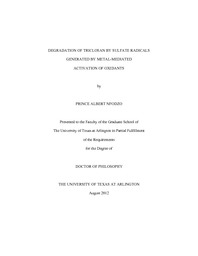
ATTENTION: The works hosted here are being migrated to a new repository that will consolidate resources, improve discoverability, and better show UTA's research impact on the global community. We will update authors as the migration progresses. Please see MavMatrix for more information.
Show simple item record
| dc.contributor.author | Nfodzo, Prince Albert | en_US |
| dc.date.accessioned | 2013-03-20T19:12:29Z | |
| dc.date.available | 2013-03-20T19:12:29Z | |
| dc.date.issued | 2013-03-20 | |
| dc.date.submitted | January 2012 | en_US |
| dc.identifier.other | DISS-11589 | en_US |
| dc.identifier.uri | http://hdl.handle.net/10106/11607 | |
| dc.description.abstract | The presence of persistent and toxic compounds, especially pharmaceuticals and personal care products (PPCPs) in water resources has generated considerable scientific, regulatory, and public interests, requiring the development of cost-effective technologies for the management of PPCPs-contaminated water resources. In particular, triclosan (TCS, 5-chloro-2-(2,4-dichlorophenoxy)phenol), an important antimicrobial agent widely used in many PPCPs, has attracted significant attention due to its potential endocrine disrupting capabilities. In order to address these concerns, advanced oxidation processes (AOPs), resulting in the generation of stronger oxidizing species, typically hydroxyl radicals (HRs) and sulfate radicals (SRs), have been studied and proposed to be effective to degrade a wide variety of organic compounds. However, most of the research studies and applications have been focused exclusively on hydroxyl radicals (HRs)-based AOPs. I evaluated the potential of sulfate radicals (SRs)-based AOPs as a new environmental risk management option for PPCPs-contaminated water with a focus on the decomposition of TCS. Sulfate radicals, generated by the activation of peroxymonosulfate (PMS) and persulfate (PS) with transition metals, exhibited high potential for the decomposition and mineralization of PPCPs. A series of dose-response studies were conducted to optimize the doses of oxidants and metals for the degradation of TCS. The speciation of metals under different pH regimes, which is a key to understanding the efficiency of radical generation, was elucidated. However, additional studies are required in order to propose SRs-based AOPs for large scale practical applications, including identification of the reaction intermediates and monitoring of toxicity. | en_US |
| dc.description.sponsorship | Choi, Hyeok | en_US |
| dc.language.iso | en | en_US |
| dc.publisher | Civil & Environmental Engineering | en_US |
| dc.title | Degradation Of Triclosan By Sulfate Radicals Generated By Metal-mediated Activation Of Oxidants | en_US |
| dc.type | Ph.D. | en_US |
| dc.contributor.committeeChair | Choi, Hyeok | en_US |
| dc.degree.department | Civil & Environmental Engineering | en_US |
| dc.degree.discipline | Civil & Environmental Engineering | en_US |
| dc.degree.grantor | University of Texas at Arlington | en_US |
| dc.degree.level | doctoral | en_US |
| dc.degree.name | Ph.D. | en_US |
Files in this item
- Name:
- Nfodzo_uta_2502D_11589.pdf
- Size:
- 525.5Kb
- Format:
- PDF
This item appears in the following Collection(s)
Show simple item record


